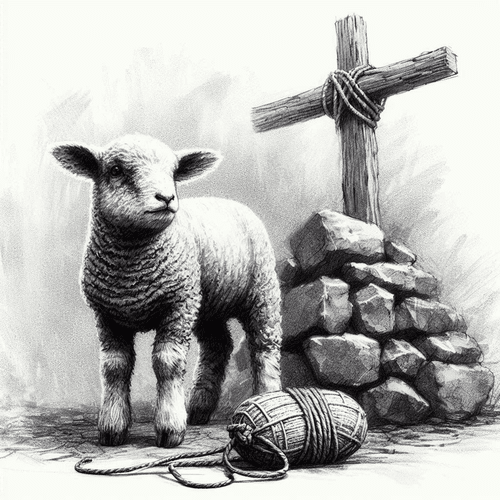How Sin Affects Our Mind: The Noetic Effects of the Fall
Granted, the term “noetic effects of sin” does sound academic, but it describes a reality we encounter daily: how our fallen nature impacts our thinking and understanding. From misinterpreting others’ intentions to struggling with spiritual truths, these effects touch every aspect of our mental and spiritual lives. As inheritors of Adam’s fall, we experience a profound corruption of our intellectual and cognitive abilities—a corruption that Reformed theology helps us understand and address.
The Biblical Foundation
Scripture clearly illustrates how sin has damaged our intellectual capabilities. Romans 1:21-22 tells us although humanity knew God, “they did not honour him as God or give thanks to him, but they became futile in their thinking, and their foolish hearts were darkened.” This darkening of understanding isn’t limited to spiritual matters. In Genesis 3, we see the first evidence of corrupted thinking: Eve’s rationalisation of disobedience, Adam’s attempt at self-justification, and both hiding from God—these are actions that demonstrated profoundly distorted reasoning.
The Apostle Paul further emphasises this in 1 Corinthians 2:14, stating that “the natural person does not accept the things of the Spirit of God, for they are folly to him.” This isn’t merely about disagreement; it’s about an inherent inability to properly comprehend spiritual truth without divine intervention.
Areas Affected by Noetic Effects
The impact of sin on our thinking manifests in multiple domains:
- Our moral reasoning has been compromised. We often find ways to justify what we know is wrong or minimise the severity of our sins. Our ethical judgment becomes clouded by self-interest and desire.
- Our understanding of God and spiritual truths has been distorted. We naturally tend toward idolatry, creating gods in our own image rather than accepting God as He has revealed Himself.
- Our scientific and philosophical inquiries are affected. While humanity retains its ability to make remarkable discoveries (through common grace), we often use these very achievements to deny our Creator or elevate human autonomy.
Practical Manifestations
One of the most evident manifestations of noetic effects is our inherent tendency to shift blame and avoid responsibility—a trait we inherited directly from Adam and Eve. Just as Adam blamed Eve (and indirectly, God) and Eve blamed the serpent, we instinctively seek to deflect responsibility for our actions onto others, circumstances, or even God Himself.
This blame-shifting mentality reveals our corrupted thinking in several ways:
- We rationalise our actions while condemning similar behaviour in others
- We minimise our responsibility while maximising others’ culpability
- We reframe situations to paint ourselves in the best possible light
Beyond blame-shifting, we see other manifestations in our suppression of truth about God, our intellectual pride, and our distorted worldview formation. We often use our intelligence and reasoning abilities to construct elaborate justifications for rejecting God’s truth.
The Reformed Understanding
The Protestant Reformers collectively emphasised the devastating impact of the Fall on human understanding. While maintaining humanity does retain significant intellectual capabilities through common grace, the Reformed tradition has consistently insisted sin fundamentally corrupts our ability to properly understand ourselves, our world, and most importantly, God.
The Reformers present this corruption not as a complete inability to think or reason, but rather as a pervasive taint affecting all our mental operations. While we retain the image of God, it is severely marred by the Fall. This understanding forms a crucial part of Reformed anthropology and connects directly to the doctrine of total depravity. The Reformers were careful to explain total depravity doesn’t mean we’re as evil as we could possibly be, but rather that sin’s effects reach into every aspect of our being—including our intellectual faculties.
This Reformed consensus was later systematised in confessional documents such as the Canons of Dort and the Westminster Standards. These affirm that while human reason remains a gift from God, it is seriously impaired in its natural state. The faculty of reason itself isn’t destroyed, but its proper operation is compromised by sin’s noetic effects, particularly in matters pertaining to God and His truth.
Hope and Redemption
Despite this sobering reality, there’s hope. Through Christ’s redemptive work and the Holy Spirit’s illumination, believers can experience progressive renewal of their minds (Romans 12:2). This renewal doesn’t entirely eliminate the noetic effects of sin in this life, but it does begin a process of intellectual and spiritual restoration.
The Spirit’s work includes:
- Opening our minds to understand Scripture
- Enabling us to acknowledge truth about ourselves and God
- Helping us recognise and resist our tendency toward self-deception
- Gradually conforming our thinking to Christ’s
Contemporary Implications
Understanding the noetic effects of sin should produce intellectual humility. Recognising our cognitive limitations and biases should make us more cautious about dismissing Scripture’s authority in favour of our own reasoning.
For Christian scholars and students, this understanding calls for:
- Careful dependence on Scripture as our ultimate authority
- Recognition of our need for the Spirit’s illumination
- Humility in academic pursuits
- Grace in dealing with others’ intellectual blind spots
Conclusion
The noetic effects of sin remind us of our deep need for Christ’s redemptive work, not just for our souls but for our minds as well. While we continue to struggle with these effects, we have hope in Christ, who is “the power of God and the wisdom of God” (1 Corinthians 1:24). Through His work and the Spirit’s illumination, we can experience gradual renewal of our minds, even as we await the day when we shall know fully, even as we are fully known (1 Corinthians 13:12).
Our response should be one of humility, dependence on God’s Word, and gratitude for His grace in providing both the common grace that enables human learning and the special grace that opens our eyes to spiritual truth. May we pursue the renewal of our minds with patience and hope, always remembering true wisdom begins with the fear of the Lord.
How Sin Affects Our Mind: Related FAQs
- Are some areas of knowledge less affected by the noetic effects of sin than others? The Reformed tradition generally recognizes that sin’s effects on our thinking vary in intensity across different domains. Mathematics and basic logic tend to be less affected than moral and spiritual reasoning, which is why even unbelievers can excel in technical fields while struggling with spiritual discernment. However, no area of knowledge is completely untouched by the Fall, as our tendency toward pride, self-reliance, and rejection of God’s authority can affect even our most basic reasoning processes.
- Can education or intellectual training overcome the noetic effects of sin? Education and intellectual training, while valuable, cannot fundamentally overcome the noetic effects of sin because they’re spiritual in nature, not merely intellectual. While education can sharpen our thinking and help us recognise some of our biases, it cannot heal our basic spiritual blindness or overcome our natural hostility toward God’s truth. Only regeneration by the Holy Spirit can begin to address these deeper noetic effects.
- How do the noetic effects of sin impact our relationships and emotional intelligence? The noetic effects of sin profoundly impact our ability to understand and relate to others by distorting our perception of both ourselves and others. We tend to minimise our own faults while magnifying others’ shortcomings, and our self-centred perspective makes it difficult to truly empathise with others. These effects particularly manifest in our inability to accurately perceive our own emotional states and motivations, often leading to self-deception in relationships.
- Do believers and unbelievers experience the noetic effects of sin differently? While believers have experienced regeneration and begin to have their minds renewed by the Holy Spirit, they still struggle with the noetic effects of sin in this life. The key difference is that believers have been given new spiritual capacities to recognise and resist these effects, along with the ability to properly understand spiritual truths. Sanctification includes the gradual renewal of the mind, though complete freedom from these effects awaits glorification.
How do the noetic effects of sin influence our interpretation of Scripture? The noetic effects of sin create numerous challenges in biblical interpretation, including our tendency to read Scripture selectively, impose our own preferences on the text, and resist its authority over our lives. This is why the Reformed tradition emphasizes the necessity of the Holy Spirit’s illumination in biblical interpretation and the importance of reading Scripture within the community of faith. Even regenerate believers must constantly guard against allowing their remaining sin nature to distort their understanding of God’s Word.
How Sin Affects Our Mind: Our Related Posts
Editor’s Pick

Why Jesus Said ‘It’s Better I Go Away’…
THE SUPERIOR GIFT OF THE HOLY SPIRIT “Nevertheless, I tell you the truth: it is to your advantage that I [...]

What About Those Who’ve Never Heard the Gospel?…
WILL GOD SHOW THEM MERCY ON JUDGEMENT DAY? Few questions tug at the Christian’s heart like this one. Picture the [...]

Cities of Refuge: Foreshadowing Our Safe Haven in Jesus
Picture this: A man is chopping wood with his neighbour when the axe head flies off the handle, striking and [...]

Testament to Design: The Engineering Marvel of Elephants
Picture an African elephant delicately plucking a single acacia leaf with the tip of its trunk, then moments later using [...]

Blue Whales: Mammoth Icons of Intelligent Design
Imagine an animal so massive its heart alone weighs as much as a small car, yet so precisely engineered it [...]

Do Unbelieving Kids Disqualify Church Leaders?
REFORMED PERSPECTIVES ON 1 TIMOTHY 3 AND ELDER QUALIFICATIONS Every pastor knows the heartbreak. A faithful elder who has served [...]

Why Did God Kill Onan? Wasn’t the Punishment Disproportionate?
The story of Onan in Genesis 38 troubles many. Why would God strike down a man for what seems like [...]

Is God Preparing Me for Ministry? How May I Know for Sure?
The question haunts many faithful believers. You’re serving faithfully in your local church, perhaps teaching Sunday school or leading a [...]

Ephesians 1:13: Was the Spirit’s Indwelling Promised of Old?
When Paul declares believers are “sealed with the promised Holy Spirit” in Ephesians 1:13, one word jumps off the page: [...]

Monergism vs Synergism: Is Salvation God’s Work Alone?
When God saves us, does He do it alone, or does He need our help? The question isn’t mere theological [...]





